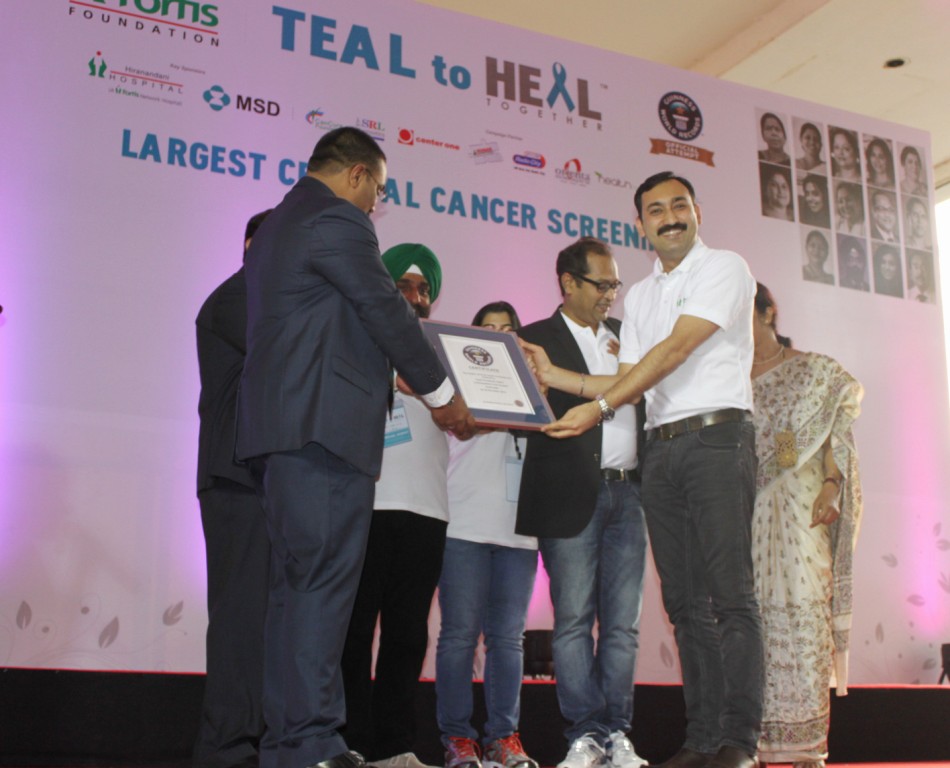Hospital performs highest number of cervical cancer screenings; over 750 women screened in eight hours.
Fortis Foundation set a Guinness World Record recently, for the highest number of cervical cancer screenings. Fortis Hospital at Vashi, Mumbai, screened over 751 women in an eight hour marathon screening, as part of its ‘Teal To Heal Together’ campaign, beating the earlier record of 350 participants held by Kaiser Permanente, San Diego (USA) achieved on January 29, 2011. More than 50 gynaecologists and oncologists worked together to screen the participants in more than 20 OPD rooms.
Speaking of the record, Varun Khanna, Regional Director (East & West), Fortis Healthcare said, “Although cervical cancer ranks as the number one killer disease in India, it is breast cancer that has received utmost attention. Through the ‘Teal To Heal Together’ campaign, Fortis is aiming to revolutionise the manner in which cervical cancer is perceived and prevented nationwide. The golden rule of prevention being better than cure is the guiding principle that has driven this campaign.”
Dr. Vandana Gawdi, Senior Consultant, Gynaecologist, Fortis Hiranandani Hospital, Vashi, said, “Cervical cancer is both preventable and curable if detected at the HPV virus stage, Oncogenic HPV infection in Indian women varies in different locations. Studies have brought out certain demographic and other lifestyle factors on the development of abnormal cytology in Indian women. This justifies the need for screening women for cervical cancer including Oncogenic HPV testing (HPV infection among various Indian women).”
Cervical cancer in India accounts for one fifth of the cervical cancer prevalent globally. On an yearly basis, over 1,30,000 new cases are detected and it is estimated that the number of new cervical cancer cases in India will increase to nearly 2,26,000 by 2025. Due to the lack of awareness and social stigma, the mortality rate among patients suffering from cervical cancer has risen from 74,118 reported deaths in 2002 to 2,70,000 reported deaths at present. Over 10 per cent of all cancer deaths annually are attributed to cervical cancer.
These mortality numbers can be partly attributed to the lack of awareness of the prevention techniques and the need for early detection through periodic health check-ups. Although cervical cancer is known to have a higher mortality rate than breast cancer, it is not yet perceived to be a social killer. It is widely and wrongly believed that the disease is transmitted only through consummation. The social perception attached to the disease, therefore, is a common deterrent for many women to come forward for a preventive examination. However, awareness amongst healthcare providers and women for the need of pap screening and preventive services is a must and should go a long way in alleviating the problem.
Improving the nutrition of the girl child, avoiding early marriage, a monogamist lifestyle, engaging in personal hygiene (to prevent HPV infections) and routine checks can prevent the occurrence of the disease to a great extent. For a developing country like India, as per the WHO norm, all women should undergo at least one pap smear test before the age of 40 years and preferably at least once in three years from the time of consummation of marriage or first sexual intercourse. If all the women between 35 and 65 years of age are screened at least once in two or three years, the frequency of cervical cancer can be greatly reduced to 93 per cent.
